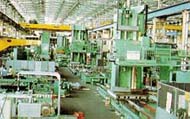Liberalisation, far from giving India prosperity, has only produced a skewed morality
 Logic choppers have taken over. Newspapers are full of reference
to debates over whether the economy is in a recession or merely
experiencing a slowdown. Whatever way it is defined, the reality
does not change. Despite an excellent monsoon, foodgrain production
was already down by five million tonnes last year.
Logic choppers have taken over. Newspapers are full of reference
to debates over whether the economy is in a recession or merely
experiencing a slowdown. Whatever way it is defined, the reality
does not change. Despite an excellent monsoon, foodgrain production
was already down by five million tonnes last year.
Farm investment has levelled off. Prospects are therefore not
any better in the current year. The flurry of high industrial
growth last year is by now a faded memory. going by the data of
the first five months of 1996-97, the downward trend in the industrial
production index is of an ominous proportion.
While overall output is barely five to six per cent higher when
compared to last year's performance, a large quantum of the industrial
production ends up as unsold stock.
In a number of crucial infrastructural industries, output is actually
turning out to be less than last year's. Export growth, too, has
tapered down to less than one half of what it was in 1995-96.
The simultaneous fall in imports, it is being assumed, is indicative
of the decision on the part of industry to cut back on expansionary
activity.
The so called sensitivity index is the Bombay Stock Exchange has
already dipped below 3000 on one occasion, and may do so again.
Sections of industrialists are apprehensive of the speed at which
the government is permitting external capital to enter the vital
sectors of the economy. Globalisation is in full bloom and foreign
parties can now have automatic entry into practically any sphere;
they have been permitted to hold majority of equity in such basic
activities as mining.
The finance minister has meanwhile been out of the country, deferentially
attending the annual meeting of the World Bank and the International
Monetary Fund in Washington and generally scrounging for
investible funds.
The gentleman deserves the utmost sympathy. He has to suffer the
consequences of the process set in motion by his predecessor during
his 1991-96 tenure. It was a primordially simple model of economic
growth the previous regime had sketched. The government should
shun development work and move away from public investments. It
must sell off lossmaking public undertakings as well as hand over
to private parties, at a song shares of profitmaking public sector
units.
Ensuring capital formation in industry or agriculture is no part
of the government agenda. This task is to be left to private entities,
including foreign investors. Direct taxes must be lowered to encourage
private activity. Import duties should similarly be slashed across
the board to encourage import of sophisticated equipment and technology
and, in addition, provide the competitive edge to inefficient
domestic industrial units.
Consumption, particularly luxury consumption, must rise. This
will sustain the demand side of production and help create the
just ambience for growth. In any event, promoting savings should
not be the government's specific concern. And why bother, foreign
investors are a-coming, they will take charge of such details.
Foreigners possess superior technology, they have capital to spare,
they have the international market at their disposal, they will
lead you along the path of smooth, rapid growth.
Five years have come and gone. Things have not quite turned according
to these prognostications. The average growth rate for the quinquennium
1991-92 to 1996-97, it now appears, could not be much higher than
the much derided Hindu rate of growth, 3.5 per cent per annum,
that was once assumed to be our perennial fate. Despite liberalisation,
we have evidently been unable to extricate ourselves from the
shackles of that destiny.
 Troublesome times. The fact that the model of economic expansion
which formed the basis of the IMF-World Bank structural adjustment
programme has been a grim no success is something the drum beaters
on behalf of liberalisation find it difficult to admit. To do
so is to acknowledge that their occupation was always a bit of
a sham.
Troublesome times. The fact that the model of economic expansion
which formed the basis of the IMF-World Bank structural adjustment
programme has been a grim no success is something the drum beaters
on behalf of liberalisation find it difficult to admit. To do
so is to acknowledge that their occupation was always a bit of
a sham.
Liberalisation has not given us growth. It has not led to any
perceptible improvement in the rate of either domestic savings
or capital formation. It has not helped to cut back the fiscal
deficit. The inflationary potential, therefore, remains as threatening
as it was five years ago. Notwithstanding the periodic bouts of
depreciating the external value of the rupee, liberalisation has
not boosted exports in any appreciable manner. Certainly it has
not narrowed the gap in the balance of trade.
There has been one major propaganda plank. Thanks to the measures
and policies adopted in 1991, our foreign balances have now reached
a comfortable plateau. Whether we will still occupy this plateau
a year hence is the question. That apart, liberalisation has not
cut back, but actually increased, the size of our long term external
debt and the burden of service payments it entails.
And lest we forget, liberalisation has meant the gradual dismantling
of some of the richest profitmaking public enterprises set up
in the country through long years of sustained endeavour. The
rough treatment accorded to loss-making industrial units and the
levelling off of investment because of government withdrawal from the
arena have also led to widespread unemployment in town and country.
The creamy layer, who have gained much in recent years, are unfazed.
Their man in North Block, the country's finance minister, is seized
of the matter. He has to make provision this year for $14 billion
to service mounting for eign debt. He has to worry about whether
some of the non-resident Indian deposits in banks due for repatriation
this year, amounting to as much as five billion dollars, could
be persuaded to abide with us. He has to take into account the
rising gap in the trade account too.
His focus is on three major assumptions. One, in inflow of extra
funds on behalf of foreign institutional investors. Two, a sharp
rise in direct foreign investment. And, finally, a generous contribution
by foreigners to global depository receipts floated by Indian
companies in the international capital market.
The finance minister needs to collect at least $15 billion during
the current fiscal year to keep his ship of hope afloat. The prospects
are however bleak, the noblesse are not obliging. The GDR issues
are a total flop. FIIs have shied off. They could hardly to otherwise
given the parlous state of the share market.
The finance minister's advance boast over his ability to entice
as much as four to five billion dollars of direct foreign investment
into the country in the course of the year is turning out to be
an even greater embarrassment.
It is accordingly in the realm of possibility that the foreign
exchange balances the country currently holds -- of the order of
$17 billion -- may all of a sudden do a Houdini. To speculate
by how much it might shrink and over what number of weeks is altogether
futile. Once foreign balances start falling, that very fact often
generates a tendency for these balances to fall further. A development of
this nature is known in vernacular as the consequence of pushing
the panic button.
Meanwhile, logic choppers have taken over the domestic quadrangle.
The dialectics over recession and pushover occupies the centrestage.
A section of industry, gravely disturbed by the increasing presence
of multinational entities, is pressing hard for a level playing
field. Another section is laying the blame on the banks.
 The high interest rate structure is supposed to be acting as a
restraint on supply and demand. None is prepared to respond to
market signals. What the liberalisation theologists are desperately
looking for is help from the state. But they cannot admit that,
even to themselves. The government is hesitant for its own reasons.
A lowering of interest rates may not be to the liking of FIIs and
NRIs.
The high interest rate structure is supposed to be acting as a
restraint on supply and demand. None is prepared to respond to
market signals. What the liberalisation theologists are desperately
looking for is help from the state. But they cannot admit that,
even to themselves. The government is hesitant for its own reasons.
A lowering of interest rates may not be to the liking of FIIs and
NRIs.
There is nonetheless some free entertainment, such as the thesis
you cannot hold liberalisation responsible for the collapse in
national morality. Those to whom making money whether by hook
or by crook is the sole objective of life and living will not readily
agree to having received encouragement from the free market
doctrine of return maximisation.
A whole lot of ministers at the Centre during the 1991-96 regime
were without question thieves and crooks. The existence of a causality
between their venality and liberalisation cannot, of course, be
statistically established. The thieves and crooks, therefore,
continue to ride high.
Consider the following statement from a well known former state
chief minister. He was referring to the St Kitts case. He would
not demur that a former prime minister named in the case might
have committed a criminal impropriety. But then, the former state
chief minister goes on to argue most forcefully, the former prime
minister deserves to be complimented. He did not commit the impropriety
to further any personal interests. He did it for the sake of someone
else.
This is the new edition of morality liberalisation has spawned.
True, he is a thief. But have a heart, he stole on behalf of someone
else. Therefore, he is not a thief.
|





 Logic choppers have taken over. Newspapers are full of reference
to debates over whether the economy is in a recession or merely
experiencing a slowdown. Whatever way it is defined, the reality
does not change. Despite an excellent monsoon, foodgrain production
was already down by five million tonnes last year.
Logic choppers have taken over. Newspapers are full of reference
to debates over whether the economy is in a recession or merely
experiencing a slowdown. Whatever way it is defined, the reality
does not change. Despite an excellent monsoon, foodgrain production
was already down by five million tonnes last year.
 Troublesome times. The fact that the model of economic expansion
which formed the basis of the IMF-World Bank structural adjustment
programme has been a grim no success is something the drum beaters
on behalf of liberalisation find it difficult to admit. To do
so is to acknowledge that their occupation was always a bit of
a sham.
Troublesome times. The fact that the model of economic expansion
which formed the basis of the IMF-World Bank structural adjustment
programme has been a grim no success is something the drum beaters
on behalf of liberalisation find it difficult to admit. To do
so is to acknowledge that their occupation was always a bit of
a sham.
 The high interest rate structure is supposed to be acting as a
restraint on supply and demand. None is prepared to respond to
market signals. What the liberalisation theologists are desperately
looking for is help from the state. But they cannot admit that,
even to themselves. The government is hesitant for its own reasons.
A lowering of interest rates may not be to the liking of FIIs and
NRIs.
The high interest rate structure is supposed to be acting as a
restraint on supply and demand. None is prepared to respond to
market signals. What the liberalisation theologists are desperately
looking for is help from the state. But they cannot admit that,
even to themselves. The government is hesitant for its own reasons.
A lowering of interest rates may not be to the liking of FIIs and
NRIs.